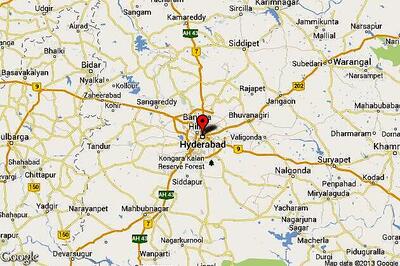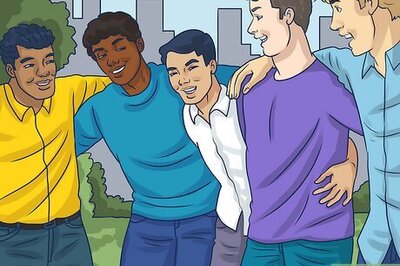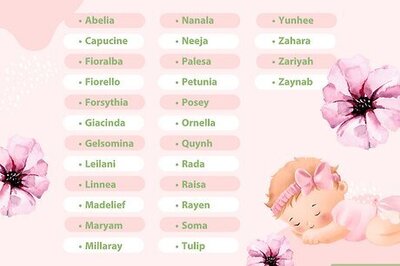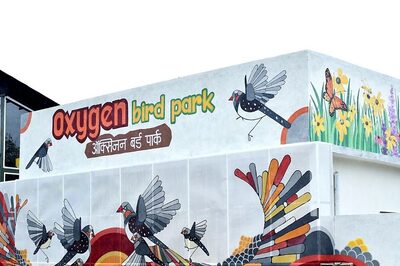
views
We did reach the Parthasarathi temple on time. For once, there were more devotees on the banks of the Pampa than inside the temple. For once, there were not many takers for the traditional valla sadya or feast which comes free. Malayalam television channels had made arrangements to cover the event live. All around there was a buzz. The public address system was busy. So were the police, who were busy more in anticipation of Chief Minister V S Achuthanandan's visit sometime later in the afternoon.
From the temple we moved on to Ashokan's home, where we were treated to a sumptuous meal. "Take a little more aviyal or this sambar," said his wife Valsala. And my mind said, 'Forget food, where is the vallam (boat).'
I didn't have to wait long. Another ride, and we were back on the banks of Pampa. And there stood the Palliyodam (boat). Decorated, worshipped, celebrated, it looked majestic. At the back of the boat was inscribed its name, Nedumbrayaru. As majestic a name as the boat.
Many had assembled to see off the Palliyodam. As all the festivities continued, the captain shouted, "No time to waste, get inside the boat." I needed no second invitation.
Soon came another order, "Now, what are you waiting for? Take the nayambu (oar)." I was only too happy to obey. I had come hoping I would get a place on the boat, and look, I was going to row, something I had never done before.
I observed others in action. And I aped them. I sat right on the edge of the boat, in all comfort and confidence, as if I had been doing this every day since my birth. I was sitting there, taking in the beauty of the Pampa, when somebody started singing, "Tha thi thi thai."
"Tha thi thi thai," others on the boat joined. What we were hearing were traditional vanchipattu (boatman's songs) written by Ramapurathu Variyar describing the story of Kuchela, the poor brahmin made rich by his friend Krishna.
And then the boat started moving, and the songs got louder, and the rowing got frenetic, but rhythmic. The boat gained speed in no time. I rowed, trying hard to row in rhythm with the one in front of me. If I go wrong, it would trigger a chain reaction. The man behind me would also go wrong, so would the others behind him. There were over 100 people on the boat. About 70 were rowing, the rest were standing and singing. Singing loud, as if throwing a challenge.
Soon the boat took a U-turn. It's a sight that can't be described. The beauty of it, the speed of it, the skill of it, the thrill of it. I turned around to see the men who steer the boat. They were the ones standing at the tail, where the boat gains height. They had nayambu that were 12 feet long, which they used to steer the huge vallam.
On the turn, we saw another boat coming. A chance to match our wits and skills, maybe. The boat came inches close to our boat. I could shake hands with them if I wanted. It is a wonderful sight to see boats travel together like we were doing. Singing the same song, rowing to the same song, oars coming down together, oars coming out together, a feeling of one-ness. As if two boats and its rowers had fused. People on the banks egged us on, theirs words of praise acted as opium to those of us on the boat. Songs got louder, rowing got faster.
"Tha thi thi thai."
A bridge was there to be tackled. The safe and sane option for the boats would be to part ways and avoid the pillars that supported the bridge. But we were on a high, though none of us had drunk. And when we are high, there is no space for reason. If we go past the bridge, it will be together, between the bank and the pillar. Even if it means going through shallow water. The captain of the other boat, waved his right hand, like a traffic cop does, and the boat turned further right. So did our boat. The two boats moved at the same pace perilously close to each other, and ahoy they went past the bridge in one piece.
*****************
There were stands on the banks, and hundreds had turned up. People were everywhere, on trees, on boats, in the water. The lucky ones who had their homes near the temple, were saved the trouble of looking for a vantage point.
We parked, is that the right word, our boat at the finishing point, near the temple. There were 37 Palliyodams (boats) in all. It seemed there was a traffic jam in the Pampa. The procession, the main event of the day, would go upstream to the starting point, from where the race will be flagged off. The boats would go in batches of four. The way we came, together, singing the same songs, rowing to the same rhythm. Parade would be a better word to describe the procession.
To save the people from boredom, there were Kathakali and Thiruvathirakkali, two dance forms, of course on boats. Some mischievous locals were moving around in boats in fancy dresses. If one dressed like an Arab sheikh, another was a pregnant woman, if one was a police officer, the other was a thief. Among them was a grandpa, a bottle of brandy in his hand. The first time he came, the bottle was full, the next I saw he had finished a quarter of that, and then half. By then he was drunk and had to be held by others on the boat.
A speech could be heard. It was the local MLA speaking about the age-old race, the importance of it, the warmth of it. As usual the speeches took up time. Those on the boat got busy. Our boat had a small hole somewhere, so small it couldn't be noticed. Water was entering the boat slowly. A 12-year-old boy was given a bucket, it was his task to drain the water that had collected in the boat.
"When we were children, we were never allowed anywhere near the Palliyodams. We had to earn our place on the boat. Now we allow children so that they have an interest in these customs," Ashokan explained to me as the boy threw buckets of water into the river hurriedly.
"We used to win the race. But the boat is old and now leaks as you can see. We stand no chance. Our regular rowers don't come for the boat races for this reason. Wait for two years, when we get a new boat, they will be back and we will win again," said somebody from the back. One reason I got to participate in the race.
The new boat would cost Rs 15 lakh. The people of the village will collect the entire amount from among themselves. If lucky enough, they could get some external assistance also. Gulf NRIs are the ones who donate the largest sums, Philip explained to me. There were many Christians (almost half of the participants) on the boats that had come. The villagers take pride in taking part in the boat race, irrespective of their religion. They came from different walks of life. Ashokan is an assistant director in the department of agriculture. His sister's son, a college student, was also on the boat. So were businessmen, big and small, professionals, labourers, boatmen, drivers. Some die-hard fans in the Gulf make trips to Kerala this time of the year just for the boat race.
**********
Firecrackers burst signalling the start of the jalaghoshayatra (procession).
"Tha thi thi thai," started the songs anew.
The first batch of four boats started moving. We followed soon. On our left was Cherukole. On the right was a boat from Maramon, the place where the Mar Thoma Church holds its annual convention (the biggest in Asia), and Keezhvanvazhi. The main singer on Maramon wore a red headband. His voice was the loudest, and he set the tempo.
All the four boats moved along, shoulder to shoulder, just inches of water separating them. The parade was a grand sight, my nephew told me later. He was on the bank catching all the action on a camera. The same songs were sung by all the singers on the four boats. People on the bank could hear them loud and clear. The rowers worked in tandem, in perfect synchronisation. As the songs got louder, the rowing became faster.
"Tha thi thi thai.
"Tha thi thi..."
The man in red couldn't finish the line. I saw him go down into the water just like that. Maramon had overturned. The more than hundred people on it were all in the water, struggling to put the boat back in place. The parade was over for them. Now if they could manage to get the boat back on time, they could race. Otherwise the boat race was as good as over for them.
"Don't look back. Don't stop rowing," came the command from our captain. The rowing picked up again. But the flame was missing. The Group of 4 had become a Group of 3.
"Maramon drowns every year. This time they drowned in the procession itself," my neighbour told me.
***********
At the starting point, boats collected for the contest. Again sets of four boats for each round. We had some time on hand. I jumped into the water, and walked to the riverside. It was raining heavily. Three hours on the boat had made me hungry and thirsty. Boats that had come from faraway places had brought food. Mainly aval nanachathu (sweet pohua) and bananas. Kuchela, it is said, had taken aval nanachathu when he went to meet Krishna.
The aval was packed in teak leaves. Those who needed food waved their hands, and those on the boats threw packets to them. We devoured three such packets in no time.
Then came the realisation that our boat was overcrowded. We had to leave out some people before the race. I opted out, knowing fully well I won't be able to meet the rigours of a full race. So did Ashokan, since he had a guest to attend to. I knew I had spoiled his party.
***********
Ashokan's house was on the other bank. This posed a problem. How would we get there? No boats could be found. Everybody was busy with the race. After half an hour Ashokan managed to get a kochu vallam (a small crude boat) from somewhere. The boat was hardly 20 inches wide and 8 feet in length. I squatted inside the boat as asked and the boat came a few notches down. The water in the river was at the same level as the edge of the boat. Every slight movement would send water gushing into the boat. Every slight movement made my heart skip a beat. Water was flowing at a rapid pace at one point. We had to go through that current.
Suddenly someone on the bank shouted, "Do you know swimming?"
"Yes, I do," I replied, but not with much confidence.
I got my breath back only on reaching the other bank.
An hour and a bath later, as I sipped on a cup of hot coffee, our team members poured in. They put all the oars in a shed near Ashokan's house. They had lost the race, but there was no sadness.
"Wait for two years, till we get our new boat. We will show how to win," was the common refrain.
The coffee and chips over, I got ready to leave.
"See you next year. Make sure you come on Onam again," Ashokan said.
"Yeah, I can't wait till you guys get a new boat," I replied. first published:October 05, 2006, 13:38 ISTlast updated:October 05, 2006, 13:38 IST
window._taboola = window._taboola || [];_taboola.push({mode: 'thumbnails-mid-article',container: 'taboola-mid-article-thumbnails',placement: 'Mid Article Thumbnails',target_type: 'mix'});
let eventFire = false;
window.addEventListener('scroll', () => {
if (window.taboolaInt && !eventFire) {
setTimeout(() => {
ga('send', 'event', 'Mid Article Thumbnails', 'PV');
ga('set', 'dimension22', "Taboola Yes");
}, 4000);
eventFire = true;
}
});
window._taboola = window._taboola || [];_taboola.push({mode: 'thumbnails-a', container: 'taboola-below-article-thumbnails', placement: 'Below Article Thumbnails', target_type: 'mix' });Latest News
As the cab we were in veered around curves, one after another, on the road from Vellore to Kottayam, I was worried. My concerns had nothing to do with the buses whizzing past with no obvious concern for other vehicles on the road. I was worried if I would reach Aranmula, which hosts Kerala's oldest boat race, on time. I had never seen a boat race, except on television. Now, I was being offered a place on a boat, thanks to my uncle Babu and his friend Ashokan.
We did reach the Parthasarathi temple on time. For once, there were more devotees on the banks of the Pampa than inside the temple. For once, there were not many takers for the traditional valla sadya or feast which comes free. Malayalam television channels had made arrangements to cover the event live. All around there was a buzz. The public address system was busy. So were the police, who were busy more in anticipation of Chief Minister V S Achuthanandan's visit sometime later in the afternoon.
From the temple we moved on to Ashokan's home, where we were treated to a sumptuous meal. "Take a little more aviyal or this sambar," said his wife Valsala. And my mind said, 'Forget food, where is the vallam (boat).'
I didn't have to wait long. Another ride, and we were back on the banks of Pampa. And there stood the Palliyodam (boat). Decorated, worshipped, celebrated, it looked majestic. At the back of the boat was inscribed its name, Nedumbrayaru. As majestic a name as the boat.
Many had assembled to see off the Palliyodam. As all the festivities continued, the captain shouted, "No time to waste, get inside the boat." I needed no second invitation.
Soon came another order, "Now, what are you waiting for? Take the nayambu (oar)." I was only too happy to obey. I had come hoping I would get a place on the boat, and look, I was going to row, something I had never done before.
I observed others in action. And I aped them. I sat right on the edge of the boat, in all comfort and confidence, as if I had been doing this every day since my birth. I was sitting there, taking in the beauty of the Pampa, when somebody started singing, "Tha thi thi thai."
"Tha thi thi thai," others on the boat joined. What we were hearing were traditional vanchipattu (boatman's songs) written by Ramapurathu Variyar describing the story of Kuchela, the poor brahmin made rich by his friend Krishna.
And then the boat started moving, and the songs got louder, and the rowing got frenetic, but rhythmic. The boat gained speed in no time. I rowed, trying hard to row in rhythm with the one in front of me. If I go wrong, it would trigger a chain reaction. The man behind me would also go wrong, so would the others behind him. There were over 100 people on the boat. About 70 were rowing, the rest were standing and singing. Singing loud, as if throwing a challenge.
Soon the boat took a U-turn. It's a sight that can't be described. The beauty of it, the speed of it, the skill of it, the thrill of it. I turned around to see the men who steer the boat. They were the ones standing at the tail, where the boat gains height. They had nayambu that were 12 feet long, which they used to steer the huge vallam.
On the turn, we saw another boat coming. A chance to match our wits and skills, maybe. The boat came inches close to our boat. I could shake hands with them if I wanted. It is a wonderful sight to see boats travel together like we were doing. Singing the same song, rowing to the same song, oars coming down together, oars coming out together, a feeling of one-ness. As if two boats and its rowers had fused. People on the banks egged us on, theirs words of praise acted as opium to those of us on the boat. Songs got louder, rowing got faster.
"Tha thi thi thai."
A bridge was there to be tackled. The safe and sane option for the boats would be to part ways and avoid the pillars that supported the bridge. But we were on a high, though none of us had drunk. And when we are high, there is no space for reason. If we go past the bridge, it will be together, between the bank and the pillar. Even if it means going through shallow water. The captain of the other boat, waved his right hand, like a traffic cop does, and the boat turned further right. So did our boat. The two boats moved at the same pace perilously close to each other, and ahoy they went past the bridge in one piece.
*****************
There were stands on the banks, and hundreds had turned up. People were everywhere, on trees, on boats, in the water. The lucky ones who had their homes near the temple, were saved the trouble of looking for a vantage point.
We parked, is that the right word, our boat at the finishing point, near the temple. There were 37 Palliyodams (boats) in all. It seemed there was a traffic jam in the Pampa. The procession, the main event of the day, would go upstream to the starting point, from where the race will be flagged off. The boats would go in batches of four. The way we came, together, singing the same songs, rowing to the same rhythm. Parade would be a better word to describe the procession.
To save the people from boredom, there were Kathakali and Thiruvathirakkali, two dance forms, of course on boats. Some mischievous locals were moving around in boats in fancy dresses. If one dressed like an Arab sheikh, another was a pregnant woman, if one was a police officer, the other was a thief. Among them was a grandpa, a bottle of brandy in his hand. The first time he came, the bottle was full, the next I saw he had finished a quarter of that, and then half. By then he was drunk and had to be held by others on the boat.
A speech could be heard. It was the local MLA speaking about the age-old race, the importance of it, the warmth of it. As usual the speeches took up time. Those on the boat got busy. Our boat had a small hole somewhere, so small it couldn't be noticed. Water was entering the boat slowly. A 12-year-old boy was given a bucket, it was his task to drain the water that had collected in the boat.
"When we were children, we were never allowed anywhere near the Palliyodams. We had to earn our place on the boat. Now we allow children so that they have an interest in these customs," Ashokan explained to me as the boy threw buckets of water into the river hurriedly.
"We used to win the race. But the boat is old and now leaks as you can see. We stand no chance. Our regular rowers don't come for the boat races for this reason. Wait for two years, when we get a new boat, they will be back and we will win again," said somebody from the back. One reason I got to participate in the race.
The new boat would cost Rs 15 lakh. The people of the village will collect the entire amount from among themselves. If lucky enough, they could get some external assistance also. Gulf NRIs are the ones who donate the largest sums, Philip explained to me. There were many Christians (almost half of the participants) on the boats that had come. The villagers take pride in taking part in the boat race, irrespective of their religion. They came from different walks of life. Ashokan is an assistant director in the department of agriculture. His sister's son, a college student, was also on the boat. So were businessmen, big and small, professionals, labourers, boatmen, drivers. Some die-hard fans in the Gulf make trips to Kerala this time of the year just for the boat race.
**********
Firecrackers burst signalling the start of the jalaghoshayatra (procession).
"Tha thi thi thai," started the songs anew.
The first batch of four boats started moving. We followed soon. On our left was Cherukole. On the right was a boat from Maramon, the place where the Mar Thoma Church holds its annual convention (the biggest in Asia), and Keezhvanvazhi. The main singer on Maramon wore a red headband. His voice was the loudest, and he set the tempo.
All the four boats moved along, shoulder to shoulder, just inches of water separating them. The parade was a grand sight, my nephew told me later. He was on the bank catching all the action on a camera. The same songs were sung by all the singers on the four boats. People on the bank could hear them loud and clear. The rowers worked in tandem, in perfect synchronisation. As the songs got louder, the rowing became faster.
"Tha thi thi thai.
"Tha thi thi..."
The man in red couldn't finish the line. I saw him go down into the water just like that. Maramon had overturned. The more than hundred people on it were all in the water, struggling to put the boat back in place. The parade was over for them. Now if they could manage to get the boat back on time, they could race. Otherwise the boat race was as good as over for them.
"Don't look back. Don't stop rowing," came the command from our captain. The rowing picked up again. But the flame was missing. The Group of 4 had become a Group of 3.
"Maramon drowns every year. This time they drowned in the procession itself," my neighbour told me.
***********
At the starting point, boats collected for the contest. Again sets of four boats for each round. We had some time on hand. I jumped into the water, and walked to the riverside. It was raining heavily. Three hours on the boat had made me hungry and thirsty. Boats that had come from faraway places had brought food. Mainly aval nanachathu (sweet pohua) and bananas. Kuchela, it is said, had taken aval nanachathu when he went to meet Krishna.
The aval was packed in teak leaves. Those who needed food waved their hands, and those on the boats threw packets to them. We devoured three such packets in no time.
Then came the realisation that our boat was overcrowded. We had to leave out some people before the race. I opted out, knowing fully well I won't be able to meet the rigours of a full race. So did Ashokan, since he had a guest to attend to. I knew I had spoiled his party.
***********
Ashokan's house was on the other bank. This posed a problem. How would we get there? No boats could be found. Everybody was busy with the race. After half an hour Ashokan managed to get a kochu vallam (a small crude boat) from somewhere. The boat was hardly 20 inches wide and 8 feet in length. I squatted inside the boat as asked and the boat came a few notches down. The water in the river was at the same level as the edge of the boat. Every slight movement would send water gushing into the boat. Every slight movement made my heart skip a beat. Water was flowing at a rapid pace at one point. We had to go through that current.
Suddenly someone on the bank shouted, "Do you know swimming?"
"Yes, I do," I replied, but not with much confidence.
I got my breath back only on reaching the other bank.
An hour and a bath later, as I sipped on a cup of hot coffee, our team members poured in. They put all the oars in a shed near Ashokan's house. They had lost the race, but there was no sadness.
"Wait for two years, till we get our new boat. We will show how to win," was the common refrain.
The coffee and chips over, I got ready to leave.
"See you next year. Make sure you come on Onam again," Ashokan said.
"Yeah, I can't wait till you guys get a new boat," I replied.




















Comments
0 comment